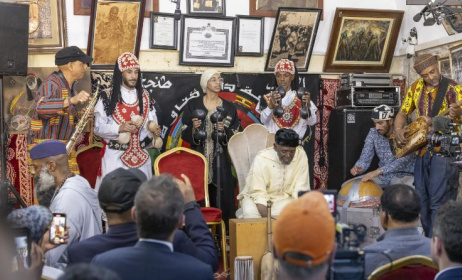Cameroonian saxophonist Manu Dibango dies of COVID-19
Legendary Cameroonian saxophonist, composer and singer Manu Dibango has died of an infection related to the novel coronavirus (COVID-19). He was 86.
 Manu Dibango.
Manu Dibango.
Dibango died in Paris, France, this morning after contracting COVID-19. He was actively involved in the music scene for more than 65 years.
“It is with deep sadness that we announce you the loss of Manu Dibango, our Papy Groove, who passed away on 24 March 2020, at 86 years old, further to COVID-19,” a statement on his official Facebook page reads.
“His funeral service will be held in strict privacy, and a tribute to his memory will be organised when possible. If you wish to express your condolences, please write to the following email: manu@manudibango.net.”
On 18 March 2020, a statement posted on his official Facebook page confirmed that the musician had tested positive for COVID-19 and was “resting and recovering in serenity” at home. The veteran musician may have had a number of underlying medical conditions that were complicated by the virus.
Dibango will be remembered for his fluency in playing the saxophone and his deep voice, which placed him at the top of Africa’s jazz music scene. He was widely hailed for restoring Afro-jazz to its former glory, notably through his 'Soul Makossa' composition, which became a success across the Atlantic, particularly in the US in the early 1970s. Various parts of the song have been adapted by prominent artists such as Michael Jackson and Rihanna. Other hits such as 'Big Blow' contributed to the awareness of African music internationally.
Among his most memorable achievements was the Wakafrika project, initiated by Yves Bigot in 1992, which enabled Dibango to revisit major African hits with musicians such as Youssou N'Dour, King Sunny Adé, Salif Keita, Angélique Kidjo, Papa Wemba and Manu Katché.
He also collaborated with many other African, American and French musicians, most notably the late Fela Kuti (Nigeria), Don Cherry (US), Ladysmith Black Mambazo (South Africa), and many more.
In 1949 Dibango was sent to school in France at the age of 15. He started classical piano lessons at age 17 before taking up the saxophone, which became his principal instrument. He also played the vibraphone.
His entry into the jazz scene was after joining Cameroonian guitarist and composer Francis Bebey and his band in the early 1950s. In 1960 he toured Europe with African Jazz, a band led by Congolese musician Joseph Kabasele (Le Grand Kallé). This sparked his interest in fusion. After the tour, he spent three years with the band before moving to Cameroon where he started his own project, Soul Makossa Gang.



































Comments
Log in or register to post comments